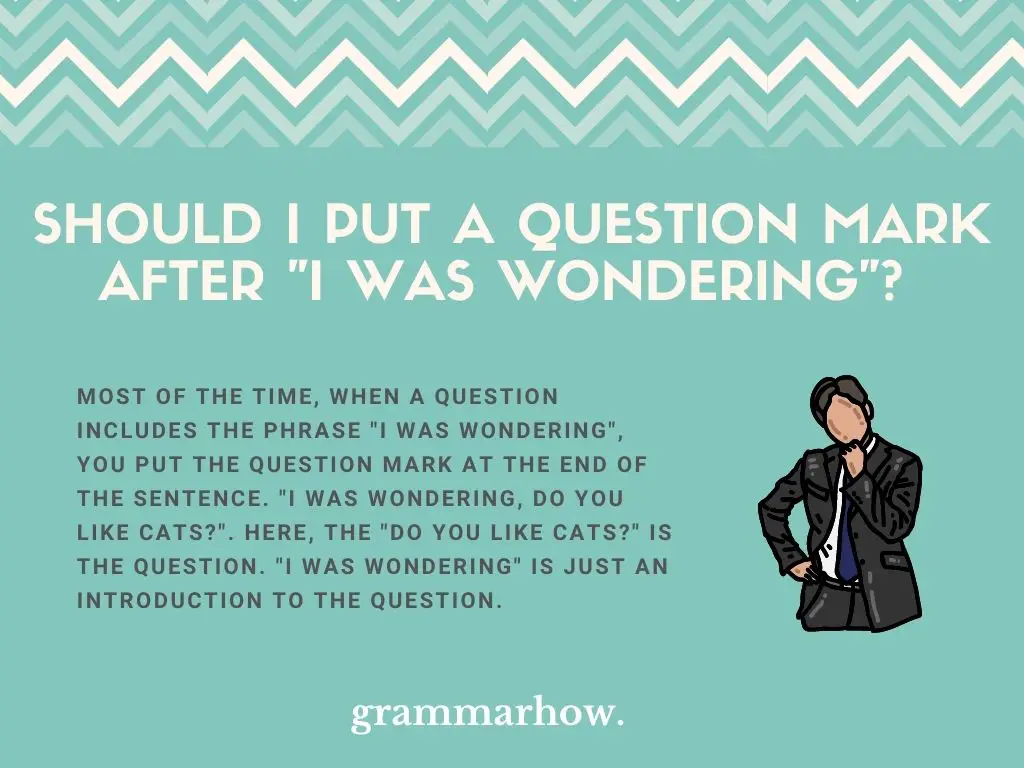If you were wondering something, where should you put the question mark? Today, we’ll explore the rules around this.
Should I Put A Question Mark After “I Was Wondering”?
Most of the time, when a question includes the phrase “I was wondering”, you put the question mark at the end of the sentence. “I was wondering, do you like cats?”. Here, the “Do you like cats?” is the question. “I was wondering” is just an introduction to the question.

Question Marks Go At The END Of A Question
The reason why they are called “question marks” is because they mark a question. You should only put them at the end of sentences that you wish to receive an answer to, or that could be answered.
As we’ve mentioned, “I was wondering” is not a question, it is a statement about your state of mind. There is no answer because it isn’t a question.
However, although it’s not a question itself, it does lead onto a question, “Do you like cats?”.
5 Examples Of “I Was Wondering” As Part Of A Question
- “I was wondering, do you like cats?”
- “I was wondering, what are we having for dinner?”
- “I was wondering, what happened at your last job?”
- “I was wondering, how many cakes did they have in the shop?”
- “I was wondering, what do you do your degree in?”
Questions Marks CAN Go At The End Of A Statement That Sounds Like A Question
There are some non-questions that sound like questions. For example…
“I was wondering if you like cats”.
To many of us, this seems like it’s clearly a question. But it isn’t. If you look at it a bit closer, you realise that the speaker isn’t asking if the listener likes cats, they’re just stating if they’re wondering whether the listener likes cats.
It’s a weird one because it isn’t a question, but if we heard it, we would still expect an answer from it. But should you add a question mark?
That depends on which scholar you ask.
5 Examples Of Statements That Sound Like Questions
- “I was wondering if you like cats”
- “I was wondering what we are having for dinner”
- “I was wondering what happened at your last job”
- “I was wondering how many cakes they had in the shop”
- “I was wondering what you did your degree in”.
“I Wonder” Follows Similar Rules
A phrase with a similar meaning, but in a different tense, is “I wonder”. It will be rare for “I wonder” to be part of a question. However, “I wonder, do you like cats?” is still a grammatically correct sentence. It’s not wrong, just rare!
However, you are far more likely to see “I wonder” in a sentence that sounds like a question but isn’t.
You might say “I wonder if she likes cats”. This sounds like a rhetorical question, but it’s technically a statement, not a question. I know, that does sound a bit confusing.
5 Examples Of “I Wonder”
- I wonder is she likes cats
- I wonder what they’re having for dinner
- I wonder what happened at his last job
- I wonder how many cakes that shop had
- I wonder what she did her degree in
All of those statements sound like rhetorical questions, but aren’t questions at all.
What Does “I Was Wondering” Mean?
We’ve spoken a lot about the grammar surrounding “I was wondering”, but what does it mean “to wonder”.
Some say that it just means “thinking”, but we wouldn’t wonder about maths while reading a maths textbook, we think about it!
Which is why “wonder” can best be defined as “to want to know”.
Google defines it as “desire to know something; feel curious.”
The use of the term “was” is interesting. Because it’s a past tense phrase but used in a present tense manner. When I say “I was wondering if you like cats”, What I mean is “I am currently wondering if you like cats”.
But, that just goes to show how weird English is.
I Was Wondering IF Vs I Was Wondering WHETHER
As well as “I was wondering if you like cats”, you might also hear, “I was wondering whether you like cats”. Is there a difference between the two?
Not really, although “I was wondering whether” is generally seen as more formal.
Conclusion
And know the rules surrounding the phrase “I was wondering” and the question mark. To put it bluntly, you should only use a question mark when you ask a question.
Most of the time, “I was wondering” phrases either need a question mark at the end, but more often, not at all.
You may also like: “I Was Wondering” vs. “I Am Wondering” vs. “I Wonder”

Martin holds a Master’s degree in Finance and International Business. He has six years of experience in professional communication with clients, executives, and colleagues. Furthermore, he has teaching experience from Aarhus University. Martin has been featured as an expert in communication and teaching on Forbes and Shopify. Read more about Martin here.
